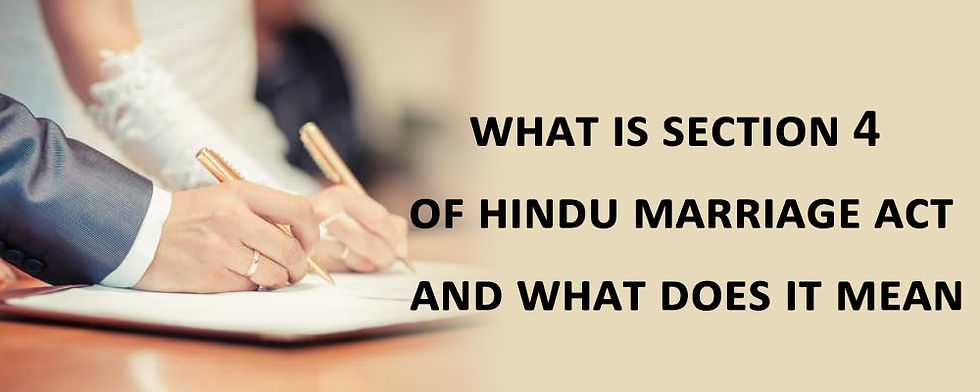WHAT IS SECTION 4 OF THE HINDU MARRIAGE ACT AND WHAT DOES IT MEAN ?
- leadindia836
- Jan 19, 2023
- 3 min read
The Act of 1955 would be applied to any person who is a Hindu, Buddhist, Sikh, or Jain by religion, or to any person who is not a Muslim, Christian, Parsi, or Jew.
Section 4 of the Hindu Marriage Act, 1955 has an overriding effect providing that all the laws which are inconsistent with the Act, whether in the form of ancient texts, customs, or legislative enactments shall be repealed.
However, the provision of this Section would not affect the-
The customary practice of marriage between two persons within the degrees of prohibited relationship provided under Section 5
The customary practice of permitting marriage between sapindas.
The right which allows the termination of a Hindu marriage recognized by the customs is conferred by a special enactment provided under Section 29.
Any proceeding which has been pending for the termination of a marriage or judicial separation as provided under Section 29.
If the Act has a retrospective effect-
It has been a well-established rule of interpretation that a statute that provides for the substantive law cannot be implemented while having a retrospective effect unless it has been expressly termed.
It is a general rule, that if a statute is passed by altering an already existing law, it has to be presumed that the new law will be applied to all the cases which are to be filed after it has been filed. Thus, it could be inferred from Section 4 as well as other sections of the Act provide that the legislature had no intention for the Act to have any retrospective effect.
Conditions for a valid marriage as provided by the Act-
The parties should not have a spouse living at the time of marriage. As provided under Section 5 of, the Hindu Marriage Act provides for monogamous marriage. If the condition for monogamy is not fulfilled, then in such a situation such second marriage will be null and void from the very beginning as provided under Section 11 of the Act.
The parties should be of sound mind. Hence, as provided under Section 5 of the Act, the parties to the marriage should not have an unsound mind; or if the party is incapacitated by a mental disorder, impotency, or is unfit for entering marital relations; or if either of the parties suffers from an insanity attack. Such marriage would be voidable under Section 12 of the Act.
The parties to the marriage should have attained the legal age for marriage.
The parties should not be within degrees prohibited relationship or be sapindas (share a common lineal descendant in their parent's ancestry) of each other.
Conclusion-
Section 4 of the Act provides for the overriding effect of the Act of 1954. All conditions required for the marriage provided for marriage under Section 5 should be fulfilled, however in case the customary practices of the parties allow for some of the conditions restricted under the Act, then as per Section 4 of the Act, such practices could be allowed.
Say for example, in some sections of the Hindu community, marriages between sapindas are permitted, here the condition related to the restriction of marriage between the Sapindas would not be applied.
In case, you are unable to understand the provisions of this Act, or if you are facing a legal suit related to family law and wish to talk to a lawyer or seek free legal advice online, you may contact us at Lead India, as we offer you an experienced team of advocates who have been successfully dealing with similar cases and could provide you with proper legal assistance for the same.
Also, if you are facing a legal situation related to civil or criminal law or any other legal matter, say for example you are looking for divorce lawyers in Ghaziabad, divorce lawyers in gurgaon, divorce lawyers in Faridabad or in your city, you may contact us.
Visit Us: - https://www.leadindia.law
Call Us: - +91-8800788535
Email: care@leadindia.law
Facebook: - https://www.facebook.com/leadindialaw
LinkedIn: - https://www.linkedin.com/company/76353439
Twitter: - https://twitter.com/leadindialaw
Pinterest:- https://in.pinterest.com/lawleadindia




Comments